Western leaders’ tribute to King Abdullah


The monarch, thought to be aged about 90, died yesterday after two decades in power in the world’s biggest oil exporter. He has been succeeded by his 79-year-old half-brother, Salman.
It means the Queen is now the oldest monarch in the world, aged 88. A spokesman for the Prince of Wales said yesterday that Charles would travel to Saudi Arabia “to pay his condolences” following the death of King Abdullah.
Advertisement
Hide AdAdvertisement
Hide AdDavid Cameron, who visited Saudi Arabia in 2012, said that he was “deeply saddened” to learn of his death. “He will be remembered for his long years of service to the kingdom, for his commitment to peace and for strengthening understanding between faiths,” he said.
“I sincerely hope that the long and deep ties between our two kingdoms will continue and that we can continue to work together to strengthen peace and prosperity in the world.”
Former prime minister Tony Blair said: “Despite the turmoil of events in the region around him, he remained a stable and sound ally, was a patient and skilful moderniser of his country leading it step by step into the future. He was loved by his people and will be deeply missed.”
When Abdullah ascended the Saudi throne in 2005, he had already been the country’s de facto ruler for a decade after his predecessor and half-brother, King Fahd, was incapacitated by a stroke.
Advertisement
Hide AdAdvertisement
Hide AdIn the terms of the ultra conservative Islamic kingdom, he was seen as a reformer, chipping away at some of the severe restrictions on women - allowing them seats on the country’s top advisory council and to attend mixed sex classes at the university he founded. However there was a limit to how far he was willing - or able - to go, and Saudi Arabia remains the only country in the world where women are not allowed to drive.
More recently, the sentencing of the blogger Raif Badawi to 1,000 lashes threw a spotlight on the kingdom’s harsh laws cracking down on any dissent against the ruling family.
Western governments - including Britain - have in turn been accused of turning a blind eye to such excesses in return for lucrative arms sales and the continuing flow of Saudi oil.
Following the 9/11 attacks on the United States in 2001, the kingdom was criticised as the cradle of a radical branch of Islam which gave birth to the extremism of al Qaida.Abdullah eventually cracked down hard after al Qaida militants mounted a series of terrorist attacks aimed at toppling the monarchy. In recent months however the Saudi authorities have been forced to deny they funded and exported an intolerant brand of Sunni Islam which gave rise to the Islamic State insurgency in Syria and Iraq.
Advertisement
Hide AdAdvertisement
Hide AdKing Abdullah was considered a strong US ally. President Barack Obama praised him for taking “bold steps” to help with the Arab Peace Initiative. Mr Obama said he “valued King Abdullah’s perspective and appreciated our genuine and warm friendship”.